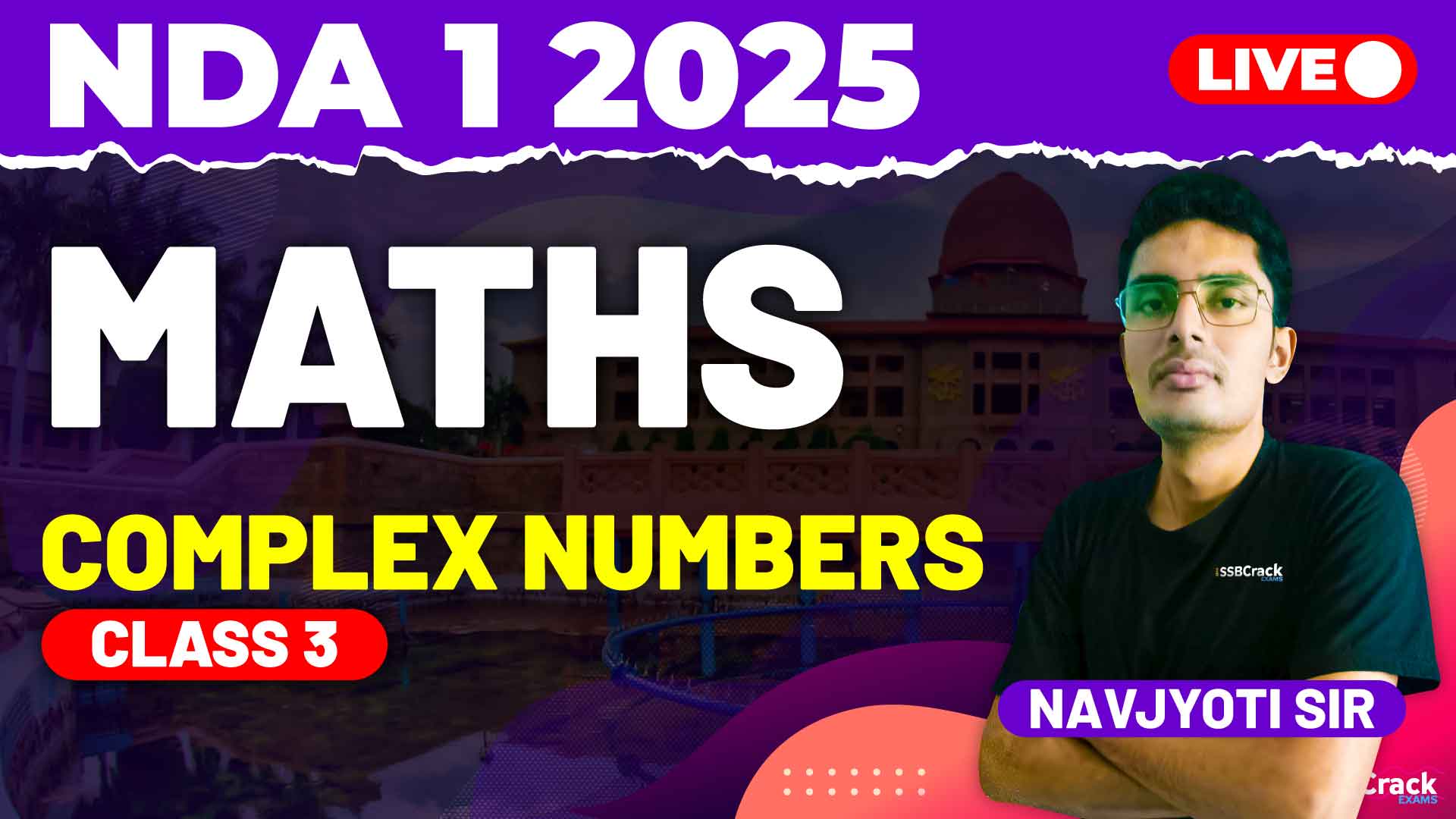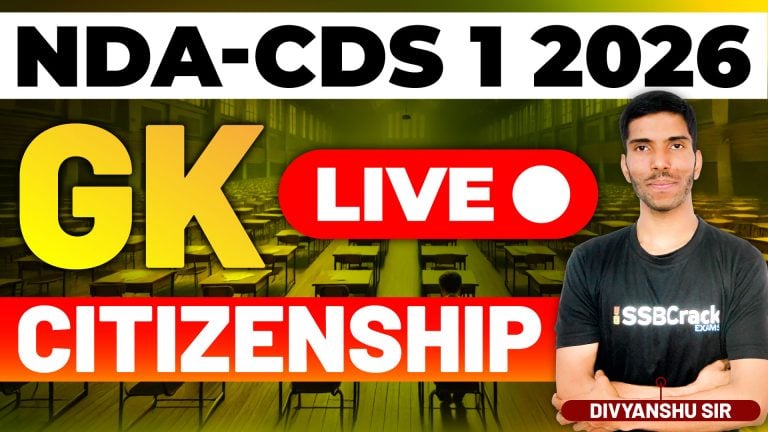Recently, a class was conducted on the topic of Complex Numbers in view of the upcoming National Defence Academy and Naval Academy (NDA-NA) Exam – Paper I – Maths. The class focused mainly on the discussion of multiple-choice questions (MCQs) that are likely to appear in the exam, based on previous years’ papers and expected trends. Complex Numbers is a critical topic in the NDA-NA exam as it tests a candidate’s conceptual understanding, analytical abilities, and problem-solving skills.
In this blog, we will provide an overview of the concepts discussed in the class, the types of MCQs that were explored, and strategies that are essential to prepare this topic for the exam. The aim is to guide you through the key points that were highlighted in the session and help you understand how to approach this topic effectively.
Class Overview: Complex Numbers and MCQs
The recent class covered several essential concepts of Complex Numbers, particularly focusing on how these concepts are applied in exam-oriented questions. Below are some of the key topics discussed, along with a brief description of their importance:
1. Basic Operations on Complex Numbers
Understanding basic operations like addition, subtraction, multiplication, and division of complex numbers is fundamental. These operations form the backbone of many problems, and without a firm grasp on them, solving more complex questions becomes challenging. The class focused on how to approach these basic operations efficiently in MCQs, ensuring that students can calculate results quickly and correctly under exam conditions.
2. Conjugate and Modulus of Complex Numbers
The conjugate and modulus are two crucial aspects of complex numbers that appear frequently in the NDA-NA exam. The modulus helps in finding the magnitude of a complex number, while the conjugate is essential in simplifying expressions, particularly when dividing complex numbers. In the class, MCQs were solved that revolved around finding the modulus or the conjugate and using them to simplify or solve equations.
3. Powers of Iota (i)
A large portion of the discussion involved questions on the powers of iota (i), where students need to recall that “i” represents the square root of -1. The cyclical nature of iota’s powers is often tested in exams, and students were shown how to quickly determine the result of any power of iota by recognizing the pattern. This reduces the time spent on such problems and ensures accuracy in answering.
4. Polar Form and Argument
The polar representation of complex numbers and their argument is another area where students often encounter MCQs. In the class, these topics were discussed with a focus on how to convert a complex number from its standard form to its polar form and how to interpret the argument of a complex number. Such problems can be simplified if students develop a geometric understanding of complex numbers, as explained during the session.
5. Square Root and Powers of Complex Numbers
The square root and powers of complex numbers can be tricky, but they are common in competitive exams. The class discussed methods to break down these problems systematically, guiding students through the step-by-step processes involved. Various MCQs involving these concepts were practiced, emphasizing the importance of accuracy and methodical problem-solving.
6. Cubic Roots of Unity
The concept of the cubic roots of unity is both interesting and important for exams like the NDA-NA. These roots have special properties that simplify certain types of equations. In the class, students were introduced to questions that tested their ability to use these roots to find solutions to complex problems. The geometric interpretation of these roots on the complex plane was also discussed, helping students visualize the problem.
Strategies to Prepare Complex Numbers for NDA-NA Exam
Given the range of concepts involved in Complex Numbers, students need a structured approach to prepare for this topic effectively. Below are some key strategies that can help:
1. Build a Strong Foundation
Before attempting advanced questions, ensure that you have a solid understanding of the basic concepts of complex numbers. This includes familiarizing yourself with terms like real and imaginary parts, modulus, conjugate, and basic operations. Start by solving simple problems that involve these basics and gradually move towards more complex MCQs.
2. Practice MCQs Regularly
Since the NDA-NA exam heavily features multiple-choice questions, it is crucial to practice as many MCQs as possible. Regular practice not only helps you become familiar with the types of questions that may appear in the exam but also improves your speed and accuracy. Make it a habit to solve previous years’ question papers and mock tests that include a variety of problems on complex numbers.
3. Time Management
In competitive exams, managing time efficiently is key to success. While practicing MCQs, set a timer to ensure that you are solving each question within a reasonable amount of time. For complex number problems, the trick is to avoid getting stuck in lengthy calculations. Use shortcuts and patterns, such as the powers of iota, to save time without sacrificing accuracy.
4. Focus on Visualization
Complex numbers can sometimes be difficult to grasp conceptually, especially when dealing with topics like polar form and the argument of a complex number. Developing a geometric understanding can simplify these problems. Visualize complex numbers on the complex plane to better understand their properties and relationships, which will make solving problems involving argument, polar form, and roots easier.
5. Revise Key Concepts Regularly
Periodic revision of important concepts is essential. Complex numbers involve many small but important details, such as the periodicity of iota’s powers, the properties of conjugates, and the behavior of complex numbers in different forms. Regular revision of these concepts will help reinforce your understanding and recall during the exam.
6. Take Mock Tests
Mock tests are an excellent way to gauge your preparation and identify areas that need improvement. Take timed mock tests that simulate the actual exam conditions to familiarize yourself with the pressure of solving complex number problems under time constraints. After each test, analyze your performance and focus on weak areas to ensure steady progress.
7. Strengthen Your Weak Areas
If you find certain sub-topics within complex numbers challenging, dedicate extra time to them. For example, if you struggle with the polar form or finding the square root of complex numbers, revisit those topics and practice targeted questions. Breaking down complex topics into smaller, manageable parts can make the learning process smoother.
Conclusion
The recent class on Complex Numbers for the NDA-NA exam provided valuable insights into how these numbers behave and how to solve related problems efficiently. The focus on MCQs gave students practical exposure to the types of questions that may appear in the exam. By practicing MCQs, reviewing previous years’ papers, and understanding core concepts such as the square root, conjugate, polar form, and cubic roots of unity, students can build confidence in this topic.
Preparation for complex numbers should be systematic, with a balance of conceptual understanding and problem-solving practice. By applying the strategies outlined in this blog—regular MCQ practice, time management, and revision—you can approach this topic with confidence in the NDA-NA exam. Mastering complex numbers not only enhances your mathematical abilities but also contributes significantly to your overall score in the exam. With the right approach, complex numbers can become one of the most scoring topics on your path to success.







